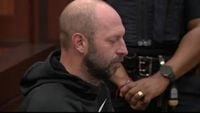On September 19, 2025, prosecutors in New York announced the arrest and arraignment of Jeremy Fistel, a 44-year-old Texas man, on charges of making terroristic threats and hate crimes against Zohran Mamdani, a prominent New York State Assembly member and frontrunner in the city’s mayoral race. This case, which has unfolded against a backdrop of heightened political violence across the United States, has sent shockwaves through New York’s political community and reignited discussions about the safety of public officials and the persistence of hate-fueled rhetoric in American politics.
According to AP and Kashmir Observer, Fistel was arrested in Plano, Texas, earlier in September and extradited to New York, where he pleaded not guilty to a 22-count indictment. The charges include making a terroristic threat as a hate crime and aggravated harassment. Prosecutors allege that Fistel sent a series of threatening voicemails and written messages to Mamdani’s office throughout June and July 2025, targeting Mamdani for his faith and immigrant background.
Queens District Attorney Melinda Katz did not mince words in a public statement. “As alleged, the defendant threatened an elected official by leaving a series of increasingly alarming anti-Muslim messages with the office of Assemblyman Zohran Mamdani,” Katz said. She detailed the content of the threats, which included: “The defendant told the assemblyman to go back to Uganda before someone shoots him in the head, to keep an eye on his house and family, to watch his back every second until he leaves America, and that he and his relatives deserve to die.” Katz added, “Let me be very clear – we take threats of violence against any office holder extremely seriously – and there is no room for hate or bigotry in our political discourse.”
The indictment lays out a chilling timeline. On June 11, Fistel allegedly left a voicemail saying, “Hey Zohran, you should go back to f------ Uganda before someone shoots you in the f------ head and gets rid of your whole f------ family, too. You piece of s--- Muslims don’t belong here.” Just a week later, on June 18, another message warned, “Go on and start your car. See what happens… yeah, keep an eye on your house and your family. Watch your f------ back every f------ second til you get the f--- out of America.”
The threats escalated in July. On July 8, Fistel is accused of submitting a written message through Mamdani’s website, stating, “I hope you get terminal cancer and die a painful death very soon. I’d love to see an IDF bullet go through your skull. Would be even better if you had to watch your wife and kids murdered in front you before they end your pathetic miserable life… I hope you all die painful sudden deaths. Do us all a favor and kill yourself.” The pattern continued on July 23, with another voicemail: “F------ terrorist piece of s---. All you and your Muslim f--- loser friends and relatives and family and wife and kids deserve to die. You deserve to be six feet under the f------ ground. I hope somebody does it quickly, somebody shoots you in the f------ face… I hope you get raped and murdered as well.”
In court, Fistel’s attorney, Todd Douglas Greenberg, argued that while the alleged speech was “unpleasant,” it constituted free speech. “No one is sitting here arguing that what my client allegedly said was proper. It was unpleasant speech, but it was free speech,” Greenberg told the court. Fistel pleaded not guilty, was released on bail, and is scheduled to return to court on November 19, 2025. If convicted, he faces up to 15 years in prison.
The severity and explicit nature of the threats prompted an immediate response from city officials. New York City Mayor Eric Adams confirmed that Mamdani has been assigned a full police security detail, a move made at the request of Mamdani’s campaign. Speaking to reporters, Adams remarked, “There is almost a level of irony to this. Here you have a person who has spent his life bashing the NYPD. He has a full detail that is moving with him because they were concerned about his life.” Adams added, “The person who made the threat should be apprehended. It just goes to show that these officers carry out their job, no matter who the person is.”
The context for this case is grim. The United States has seen a surge in political violence in recent months, including the killing of conservative activist Charlie Kirk at an event in Utah and the fatal shootings of a Democratic state lawmaker and her husband in Minnesota earlier this year. Politicians from both major parties, as well as officials at every level of government, have been forced to reckon with acute security concerns. Some have canceled public appearances, while others now rely on a significant police presence for their safety.
Mamdani, who would become New York City’s first Muslim mayor if elected, was born in Kampala, Uganda, to Indian parents. He became a U.S. citizen in 2018, shortly after graduating from college, and was first elected to the New York State Assembly in 2020. In June 2025, he told reporters that he had received threats “on the people that I love.”
Mamdani’s campaign responded to the indictment with a statement emphasizing the broader climate in which these threats have occurred. “We are grateful to District Attorney Katz’s office for treating this matter with the seriousness it deserves. Unfortunately, threats of this nature are all too common—and they reflect a broader climate of hate that has no place in our city,” the statement read. The campaign also reassured the public about the candidate’s safety: “We are thankful for the security measures in place for both the Assembly Office and the campaign, and we want to reassure the community that Zohran and the team are safe. We respect the judicial process and will not be commenting further on the details of the case.”
The case has also sparked debate about the boundaries of free speech and the responsibilities of law enforcement in protecting public officials. While Fistel’s defense maintained that his words, however offensive, were protected by the First Amendment, prosecutors and many public figures have argued that explicit threats of violence—especially those targeting someone’s religion or ethnicity—cross a clear line and demand a strong legal response.
As the city awaits the next stage of the legal process, Mamdani’s campaign and supporters remain vigilant. The episode has become a flashpoint in the ongoing national conversation about political violence, hate crimes, and the safety of those who choose to serve in public office. With the mayoral election approaching, the outcome of this case—and the broader issues it raises—will likely reverberate far beyond the courtroom.
For now, the city’s attention is fixed on the intersection of justice, security, and the enduring challenge of hate-driven threats in American democracy.




